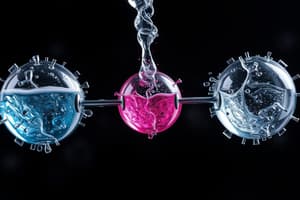Podcast
Questions and Answers
The reaction between alkanes and iodine is explosive, producing carbon and hydrogen iodide.
The reaction between alkanes and iodine is explosive, producing carbon and hydrogen iodide.
False (B)
The reaction between alkanes and fluorine produces the desired substitution reaction.
The reaction between alkanes and fluorine produces the desired substitution reaction.
False (B)
In the radical reaction mechanism, the termination step involves the interaction of two radical species to form a stable product.
In the radical reaction mechanism, the termination step involves the interaction of two radical species to form a stable product.
True (A)
The reaction between alkanes and chlorine or bromine does not require light or heat to produce the desired alkyl halides.
The reaction between alkanes and chlorine or bromine does not require light or heat to produce the desired alkyl halides.
Radical initiation can be achieved through chemical means, such as the use of peroxides or hydroperoxides, or through photo-induced initiation using UV light.
Radical initiation can be achieved through chemical means, such as the use of peroxides or hydroperoxides, or through photo-induced initiation using UV light.
The chloration of methane is a slow reaction that requires high temperatures.
The chloration of methane is a slow reaction that requires high temperatures.
The reaction between alkanes and iodine is a useful method for alkane halogenation.
The reaction between alkanes and iodine is a useful method for alkane halogenation.
The propagation step in the radical reaction mechanism involves the interaction of one radical species with another molecule to create another radical species.
The propagation step in the radical reaction mechanism involves the interaction of one radical species with another molecule to create another radical species.
The reaction between alkanes and chlorine or bromine produces a mixture of products, with little selectivity.
The reaction between alkanes and chlorine or bromine produces a mixture of products, with little selectivity.
The initiation step in the radical reaction mechanism involves the interaction of two radical species to form a stable product.
The initiation step in the radical reaction mechanism involves the interaction of two radical species to form a stable product.




